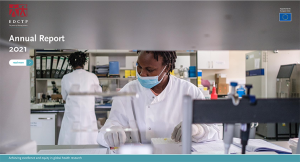EDCTP Annual Report 2021: achieving excellence and equity in global health research
29 July 2022
Nine years since its launch, the second EDCTP programme (EDCTP2) is already achieving its objectives and successfully advancing the development of medical interventions and building sustainable clinical research capabilities in sub-Saharan Africa. The 2021 Annual Report summarises progress and achievements of EDCTP-managed activities as well as projects directly funded by Participating States that are making an important contribution to the EDCTP2 portfolio.
“As can be seen from the stories in this Annual Report, the studies EDCTP is funding promise to make a significant contribution to the advancement of diagnostics, vaccines, drugs and other interventions for the most important infectious diseases affecting sub-Saharan Africa, benefiting its most vulnerable populations, including infants, children, adolescents and pregnant women.”
Professor Yazdan Yazdanpanah, Chair of the EDCTP General Assembly in 2021
“Despite the prolonged COVID-19 pandemic, EDCTP has demonstrated laudable resilience and is yielding very transformative results bridging critical gaps on various fronts. After 8 years of mission-focused implementation of EDCTP2 with the cooperation of the many public and private partners, our constituencies, as well as the fully committed and reliable High Representatives and EDCTP staff, we are inspired to share our progress in the journey, so far.”
Dr Michael Makanga, Executive Director of EDCTP2
Highlights of the EDCTP 2021 Annual Report include:
- The total value of EDCTP2 grants reached €814.45 million at year-end to support 435 projects.
- At the end of 2021, the EDCTP2 portfolio comprised:
- 140 collaborative clinical research projects
- 90 research capacity development projects
- 205 fellowships.
- Scientific highlights included:
- Publication of results from the AMBITION-cm trial on a simplified treatment for cryptococcal meningitis, which has already led to an updated WHO recommendation.
- Highly promising results from the MMVC phase II trial of the R21/Matrix-M malaria vaccine, which for the first time achieved WHO’s 75% efficacy target.
- Confirmation of the safety and efficacy of arpraziquantel in the PZQ4PSAC project, which will pave the way to its use among young children in mass drug administration campaigns to prevent flatworm infections.
- The Tenth EDCTP Forum was held in a hybrid format in October 2021, hosted by the Mozambique National Institute of Health and the Manhiça Health Research Centre.
- EDCTP Prizes were awarded to Professor Sir Alimuddin Zumla, UK (Dr Pascoal Mocumbi Prize winner), Professor Margaret Gyapong, Ghana (Outstanding Female Scientist Prize), Professor Graeme Meintjes, South Africa (Scientific Leadership Prize) and the African-European Tuberculosis Consortium (AE-TBC) (Outstanding Research Team Prize).
- EDCTP launched a new Global TB Vaccine R&D Roadmap, to coordinate and accelerate global action on TB vaccine development and implementation.
- EDCTP has forged close links with the African Union and agreed a Memorandum of Understanding in 2021 to advance joint activities on emerging and re-emerging infectious diseases, epidemic intelligence, and capacity building for preparedness and outbreak response.
- Ten international consortia were funded through the joint scheme with the Africa Centres for Disease Control and Prevention (Africa CDC) designed to build capacity in epidemiology and biostatistics. The scheme will create a cohort of experts in public health data collection and analysis, enabling countries to better identify and respond to public health challenges, including pandemics.
- Through a Participating States Initiated Activity funded by the UK, EDCTP Regional Networks of Excellence have launched PhD training schemes targeted at women, to address gender barriers to research at this career stage.
- Of all technical reviews coordinated by EDCTP, 39% have been conducted by female experts; the success rate of proposals led by female coordinators is similar to proposals led by male coordinators, and 37% of EDCTP-funded projects are coordinated by female researchers.

